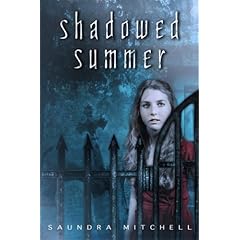
Rating: 1.5/5 stars
This review will be fairly short, because I was disappointed in this book and don't feel like spending much time on it. The premise seemed promising: a young girl, displaced and resentful after her family moves from their farmhouse to an anonymous city suburb, discovers that there's someone living behind the walls -- someone small, but with a big attitude. The two unlikely friends -- Goody Two-Shoes T.J. and the punk-rock 'Little' (the term for the diminutive not-fairy people) Elizabeth find common ground in their frustrations and confused longings. Both girls learn from each other as well; T.J. is in awe of Elizabeth's fierce independence and adventurousness, while the rebel Little discovers that some of T.J.'s cautious planning is necessary in a world that's much larger and more dangerous than she realized.
I wanted to like this book -- I remembered reading The Blue Girl by de Lint and enjoying it quite a bit -- but Little (Grrl) Lost was just...boring. Not even in that nothing really happens, plot-wise, but the characters themselves are all horribly flat and dull. T.J. isn't just a Goody Two-Shoes -- she isn't interesting at all, even when she starts 'rebelling' and 'finding herself.' All of the characters are more or less one-dimensional, and Elizabeth's tough girl act is so transparent it's not even worth the effort. No one seems capable of emotional complexity or interest; a character is either happy or sad or angry and that's it -- no mixed feelings, contradictions, denial, etc -- and then they go ahead and tell other characters about their feelings and motivations like they're in a casting call or something. It's all so mundane and stereotypical and irritating, like listening to someone describe their dream about being back in high school and forgetting their locker combination -- and then expecting you to care about this for who knows what reason. It broke my heart, because how can you make a book with fairies and magical creatures this boring? How?
On the one hand, I can appreciate what de Lint was doing in creating a teenaged character who isn't totally angsty and dark, living in a broken home with a distant father and a neurotic mother and a brother who does drugs/joins a gang/plays gory video games all day. T.J.'s family is obviously grounded and loving and close, and even Elizabeth comes to realize that her parents aren't completely illogical pod people -- but there's a spectrum for all this, and de Lint avoids the Cyclonic Trauma Zone of Teenagedom by shoving everything into Stagnant Pond Land.
Supposedly the characters develop and grow and find new places in the world. I mostly stopped paying attention about halfway through -- honestly, Elizabeth could've gotten eaten by a cat and T.J. run over by a bus without causing a blip on my emotional radar. At least that might have been more interesting.



